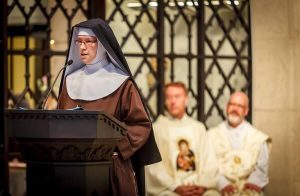Contemplative Desert Living by Mother Marie André
Many people have questions about this life and they often don’t understand what we do or why we do it! The interior apostolate (the contemplative life which we live here as cloistered nuns) CAN subsist by itself. Our life here justifies the absence of an exterior apostolate/working out in the world by drawing down from Heaven an abundance of divine grace to assist the evangelical workers (especially priests and active-order Sisters) in the field of their labors.
How is this done? By our life of prayer before Our Lord in the Most Blessed Sacrament. Are we perfect in doing this? No…we have our faults and failings. But God takes our mediocrity and imperfect efforts and He makes it work!
Some might look upon Jesus’ call as a hiccup in a young woman’s plans for the future for having a family and a career, and this decision is often incomprehensible and viewed as a contradiction because she is denying herself the chance to have children and a career. But it’s not puzzling or bewildering to the one being called and hearing the Voice of the Lord!
The very freedom that seems to be sacrificed when a woman enters the monastery is actually present and is what Jesus appeals to when He asks us to “Follow Him.”
This freedom is the total dedication to God in our daily life, and so we pray always every day of our lives for the grace to understand better how Jesus calls us.
When one is called to marriage and after hopefully finding the right person, one marries for love and so a woman enters religious life out of enormous love; without that love, what a contemplative nun does would not make any sense.
A quote from Fr. Robert Barron, which fits the hidden and often times routine life of the contemplative nun:
Our purpose in life is not to draw attention to ourselves, to have a brilliant career, to aggrandize our egos, rather our purpose is to serve the Master’s need, to cooperate, as He sees fit, with His work. Might we be unnoticed in this? Yes. Might we be laughed at? Of course. But the Master has need of us and so we perform our essential tasks.
Again I quote Fr. Barron:
The desert represents a stripping away so as to make the fundamental things appear. In the desert there are no distractions or diversions or secondary matters. Everything is basic, necessary, simple. One survives or one doesn’t. One discovers in the desert strengths and weaknesses she didn’t know she had.
And especially for a Poor Clare of Perpetual Adoration, she must come to the awareness that it is not in her safety or well-being that she trusts but in the Lord’s Eucharistic Presence and if she can do that, then she is not afraid to take risks.
Since we rely solely on the Lord’s providence, it is apropos to read the question in Psalm 78: “Is it possible for God to prepare a table in the desert?” And like the Israelites of old, we have to say YES!!!! Not only a table with the manna of old, but a Eucharistic Throne, and this happens because God does all!
No one realizes more than women who are consecrated Religious that we are signs of contradiction in a very contradictory world but God gives meaning to our lives because He is the center of our lives.
And lastly I’ll end here with a quote from a little known but in no means insignificant French saint: St. Jeanne Antide Thouret:
You are beginning to run the race of your vocation. Run! Run at great speed without looking behind. Run without stopping. Follow constantly and truly the route traced for you. When God calls and is heard, He gives all that is needed.


